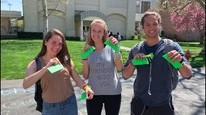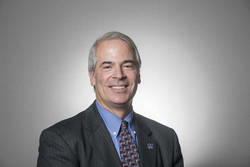Monmouth’s Student Athlete Advisory Committee (MSAAC) hosted its first Mental Health Week from April 22 through April 26, which included various on-campus events, information sessions, and an extensive social media campaign.
The week is part of the Metro Atlantic Athletic Conference’s #A11MAACMinds initiative to bring awareness to mental health.
On April 22, MSAAC hosted Campus Connect Suicide Prevention Training in the varsity club of the OceanFirst Bank center. This seminar was open to all student athletes who wanted to learn what to do when someone they know is struggling.
Emily Howard, Assistant Athletics Director for Academic Support and advisor to MSAAC, worked with the student-athletes to plan and execute activities of the week.
“I am thrilled to be able to support our student-athletes in a Mental Health Awareness Week. It is so important that we are speaking about of mental health, and spreading the message that is it okay to ask for help,” said Howard. I am so proud of our student-athletes for opening up about mental health, and being willing to share their experiences.”
The social media campaign included all 11 member schools in the MAAC. Every post by each institution was tagged with #A11MAACMinds. Events and statistics were disseminated over the various social media accounts. According to the National Collegiate Athletic Association (NCAA), 10 to 15 percent of student-athletes suffer from psychological distress, while only 8 to 9 percent seek help from mental health services.
Megan Lindstrom, a senior psychology student and member of the Track & Field team, played a part in organizing the week’s events and the video that was produced with help from the athletic department. She recently completed her thesis on the topic of student athletes and mental health: “Student-Athlete Perceptions Towards Mental Health and Help Seeking.”
“I think what surprised me most in a good way was the fact that male and female athletes perceived stigma towards mental health was not as high/different as I was expecting. Going into my research I was confident that males would present greater stigma than females, but in the end their total scores were nearly identical,” said Lindstrom.
Lindstrom believes that it is incredibly important for athletes to share their own stories if they are able and willing. “There’s this belief as athletes that we are physically and mentally stronger, which in part is true; but this strength does not make us immune to mental health struggles, and I think the fear of vocalizing your struggles as an athlete is due to the fact that they don’t want to be viewed as weak,” said Lindstrom.
On April 25, MSAAC will be hosting its Student-Athletes and Mental Health Panel. The panel is comprised of student-athletes from five different athletic teams and will be moderated by
Katie Rizman, a licensed clinical social worker and psychological counselor in Monmouth’s Counseling and Psychological Services office.
Rizman said that her office and the offices of her colleagues are constantly filled with students who are feeling the pressure of school and life. “If you asked me that question just a few years ago I could easily identify times of the academic year that CPS was busier, such as the beginning of the semesters and prior to exams. However, in the last couple years we have been consistently busy all academic year,” said Rizman.
Out of college, Rizman thought that she wanted to be a college basketball coach. She became a graduate assistant at Salisbury University and worked to get her Masters in Social Work (MSW). “…My MSW internship experience was at the college counseling center there and through that opportunity I became inspired to support college students ‘off the court,’” said Rizman.
“College is such a pivotal developmental time for young adults, and I felt challenged and excited to help support college students mentally and emotionally so that they are able to succeed not only athletically but academically, personally, and professionally,” continued Rizman.
Although the MSAAC Mental Health Week activities and social media campaign is targeted towards student-athletes, the purpose of the week is to break the stigma around mental health in general. According to data college by the Anxiety and Depression Association of America, “85 percent of college students reported that they felt overwhelmed by everything that they had to do” with anxiety being the top concern among college students. Additionally, “40 million U.S. adults suffered from an anxiety disorder and 75 percent of them experience their first episode by the age of 22.”
Rizman wants to remind student-athletes and all students that, “you are not alone.”
“It is ok to be hesitant to reach out and it’s important to know what resources are available to you. CPS is free and confidential and we are happy to consult with students to explore options that could be helpful for them in supporting their personal, academic and athletic performance,” said Rizman.
Monmouth students can find help on campus with the Counseling and Psychological Services Center, located on the third floor of the student center. Appointments can be made by calling 732-571-7517 or emailing muconseling@monmouth.edu. Walk-ins are also welcome.
PHOTO TAKEN by Caroline Mattise




